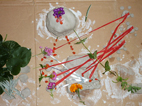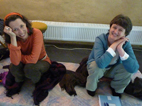Practitioner StanceThis approach does not give primacy to professional expertise, but maintains that each person intrinsically holds the keys to their pathway to health. The professional in the field may serve as an ally who respects the uniqueness of each person and is willing to enter into a collaborative venture in finding a viable way of facing moment by moment experience as it arises. Much of the theory mentioned above may well be part of the practicing Tara Rokpa therapists' map in their engagement with others. It may not need to be explicated within the therapy itself, but can be very useful to the therapist in attempting to make sense of what is happening in this joint venture. Tara Rokpa Psychotherapy incorporates the fundamental view held by both Constructivists and Buddhist thinkers that ultimately the individual is responsible for the reality which they bring forth, in living. However, it is important to look at what we mean by responsible. Over and over again we see that when one makes a sincere attempt to understand another, from the point of view of their personal, social and political context, we can see that the way that a person construes their world does make sense. It becomes important then to provide a conversational space for individuals to understand more fully how they bring forth the realities which they inhabit. The emphasis in these traditions is on the attempt of the person to a take a position of observer to their own construct system whereby it becomes possible for them to begin to question and become aware of their anticipations even as they arise. One wakes up to the recognition that each moment gives birth to new possibilities and that life is indeed a moment to moment affair. In this model of psychotherapy, not doing can be more important than doing. The essence of the work is about simply holding the space as openly as possible - with honesty which is not without kindness and with an open compassion which holds no particular expectation of what is supposed to happen. This approach can be used with individuals, couples, families, groups or organisations and social networks. 
At the beginning of Tara Rokpa is a process called Back to Beginnings What we do. The emphasis here is on self-organised and largely self-supporting groups. Participants are invited to engage with various relaxations and visualisation exercises, exchange of simple massage and other co-ordination exercises, working with art materials and writing. There is time for participants to socialise in the gaps between group work and this also plays a part. Therapists propose ways that members of the group may continue on their own both individually and as a group, yet recognise that some individuals may require therapists' help on a one-to-one basis in their self-defined endeavours. In Back to Beginnings, participants are encouraged and supported to accomplish a very thorough review of their lives to date in two modes. First, in the highly subjective mode 'what do I remember from that time of my life?' This review goes through the life backwards, forwards and backwards again chronologically three times and thus also involves a self-defined exploration of memory. The second is the well-considered reflective mode. The reflections which participants are invited to engage with involves an ongoing re-examination of one's own value system. Such inquiry includes assessing the personal validity of such evaluations. This structured task of construal/ reconstrual allows space for the examination of how we create a sense of our identity.1 The method attempts to foster a particular relationship which puts an emphasis on intrinsic equality and naturalness. While certain views are held about what might be helpful, therapists are trained to keep an open mind. Thus psychotherapist and participant share the joint venture of trying to maintain a freedom from cycles of experience that are unsatisfactory and unfulfilling.
|


